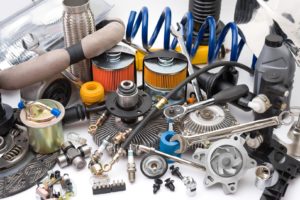Constraints, Opportunities and Challenges for Spare Parts and Technical Data
The Anti-Waste for a Circular Economy Act (AGEC), adopted in February 2020, aims to transform consumption and production patterns in France by reducing waste and promoting repair and re-use. This article focuses on the implications of this law for spare parts and technical data, exploring the constraints and opportunities for dealers and repairers, the challenges for manufacturers, and the expected impact of this law in the medium term.
Constraints for Merchants and Repairers
Availability and management of spare parts
Stock management :
- Repairers have to maintain a sufficient stock of spare parts, which involves considerable logistical costs.
- Speed of supply is crucial to customer satisfaction, requiring efficient stock management systems.
Speed - availability: a consumer expectation not to be overlooked...
Technician training :
- Technicians must be trained in the repair of various products and the use of specific spare parts.
- Ongoing training and regular updates are essential if you are to remain competitive.
Human resources! Training and the lack of manpower appear to be the main obstacles and the major handicap.
It's a godsend for employment and inclusion, but there's still a lot to be done, and it will be accompanied by the creation of value and wealth. Or how to provide economic compensation for what reuse and the circular economy will shake up in the habits of the consumer industry. This will inevitably involve a phase of creative destruction.
Used Spare Parts Proposal
Quality and Safety :
- Repairers must guarantee the quality and safety of used parts, which requires rigorous checks.
- Liability in the event of the failure of a used part can pose legal risks.
Logistics and Procurement :
- Sourcing used parts can be complex, requiring partnerships with specialist suppliers.
- The logistics management of used parts requires effective traceability and returns management.
The EPR sector, whatever the sector, must continue to develop and equip itself with labels, tools and resources to provide guarantees and combat parts whose quality and origin may present risks for users and consumers.
Opportunities for Merchants and Repairers
Expansion of the Repair Market
Market growth :
- The obligation to offer second-hand spare parts and to facilitate repairs opens up new economic opportunities.
- Consumers are increasingly aware of sustainability issues and prefer to repair their products rather than replace them.
Although the percentage is still very low, repairs using second-hand parts are still marginal due to their scarcity and the need to respond quickly to consumer demand.
Development of Innovative Services:
- Companies can offer innovative services such as preventive maintenance subscriptions, repair workshops and recycling programmes.
- Digital platforms that make it easier to order spare parts and book appointments for repairs increase efficiency and customer satisfaction.
The rise of e-commerce and digitalization is opening up new possibilities, but practices and customs will have to be monitored and controlled to prevent incentives to repair from being misused solely for capital purposes.
Competitive advantages
Customer loyalty :
- Offering quality repair services with available and reliable spare parts strengthens customer loyalty.
- Transparency about the origin and quality of used parts builds trust and reputation.Ecological positioning :
- Adopting a sustainable approach and promoting the circular economy attracts environmentally conscious customers.
- Sustainability certifications and labels are becoming major marketing assets.
Challenges for manufacturers
Adaptation to regulations
Modification of Production Processes :
Manufacturers must incorporate processes that make it easier to dismantle and repair products.
Using recycled materials and designing sustainable products requires investment in R&D.
Spare parts management :
- Ensuring the availability of spare parts over several years poses logistical and financial challenges.
- Manufacturers need to put in place effective management systems to forecast demand and manage stocks.
Intellectual Property and Access to Technical Data
In our view, this is a very sensitive point on which legislation will have to evolve if the momentum is not to be lost.
Opening Technical Data :
- Manufacturers must provide the technical information needed to repair products, which can raise intellectual property issues.
- The protection of patents and industrial secrets must be balanced with the need to facilitate product repair and maintenance.
Traceability and compatibility :
- Manufacturers need to ensure the traceability of spare parts to guarantee their compatibility with products, which requires sophisticated data management systems.
- Standardisation of parts and interfaces can help overcome these challenges, but requires collaboration between different players in the industry.
The adoption of codifications, nomenclatures and reference systems is essential for sharing data and compatibility information. A trusted third party must oversee and implement the process.
Costs and Investments
Initial investment :
- Manufacturers need to invest in upgrading production lines and spare parts management systems.
- The cost of training staff in new regulations and techniques is high.
Operating costs :
- Continuous management of spare parts, including storage and quality control, increases operational costs.
- Setting up robust after-sales services requires additional resources.
Industrial strategies
Innovation and Ecodesign
Ecodesign :
- Designing products that are easy to repair and dismantle reduces repair costs and extends product life.
- Using recycled and sustainable materials meets the expectations of consumers and regulators.
Technology and digitisation :
- The adoption of technologies such as 3D printing for the manufacture of spare parts reduces lead times and costs.
- Digitalising spare parts management processes, including traceability and real-time stock management, improves efficiency.
Collaboration and partnerships
Partnerships with Spare Parts Suppliers :
- Working with suppliers who specialise in used parts secures supplies and guarantees quality.
- Partnerships with recycling companies facilitate the collection and processing of recycled materials.
Repair Ecosystems :
- Create networks of approved repairers and train specialist technicians to strengthen the after-sales service.
- Developing collaborative platforms for sharing spare parts and know-how optimises resources and reduces costs.
Impact on a national, European and global scale
In France
Waste reduction :
- A significant reduction in plastic and other solid waste.
- Economic development in the repair and maintenance sector.
Widespread awareness :
- A population that is more aware of the importance of sustainability and waste reduction.
In Europe
Harmonisation of Policies :
- Harmonisation of waste management policies and promotion of the circular economy.
- Increased cooperation between member countries to share best practice and innovation in sustainability.
Worldwide
Leadership in Sustainability :
- France can become a world leader in sustainability policies, influencing other countries to adopt similar measures.
- An overall reduction in waste and better management of natural resources on a global scale.
Conclusion
The anti-waste and circular economy measures introduced by Law 2020-105 bring significant economic and environmental benefits for consumers, while posing constraints and challenges for manufacturers, merchants and repairers. Companies that adapt quickly to these new requirements by adopting efficient spare parts management strategies, innovating in eco-design and developing strategic partnerships will benefit from the growth of the repair and reuse market. Ultimately, this legislation aims to create a more sustainable and circular ecosystem that benefits the environment, the economy and society as a whole.
In this way, we can only hope to extend the life of a product, appliance or piece of equipment to the state of an active and useful resource, rather than being reduced to the state of waste. A first step on the long road ahead of us between now and 2050.
For more details on the evaluation of the AGEC Act, see the full article on halteobsolescence.org.









